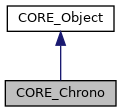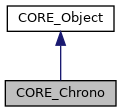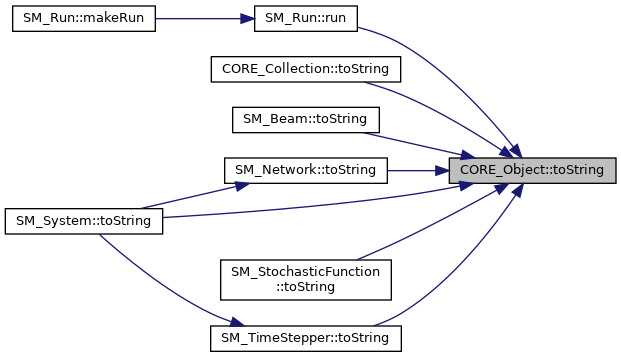this class describes the chono class by default write on standart output More...
#include <CORE_Chrono.h>


Public Member Functions | |
| CORE_Chrono () | |
| build a CORE_Chrono More... | |
| virtual | ~CORE_Chrono (void) |
| destroy a CORE_Chrono More... | |
| virtual tMemSize | getMemorySize () const override |
| return the memory size of the class and the memory size of all its attributes/associations More... | |
| void | start () |
| start the chrono More... | |
| std::chrono::duration< tReal > | stop () |
| stop the chrono and return the duration time in seconds as a real More... | |
| tString | getDate () |
| get the date in string More... | |
| template<class T > | |
| std::shared_ptr< T > | getSharedPointer () |
| return the shared pointer for this More... | |
| template<class T > | |
| std::shared_ptr< const T > | getConstSharedPointer () const |
| return a const shared pointer for this More... | |
| virtual tMemSize | getContentsMemorySize () const |
| return nthe memory size of the included associations More... | |
| template<class T > | |
| tBoolean | isInstanceOf () const |
| test if the clas T is an instance of this class More... | |
| tString | getClassName () const |
| return the name of the class More... | |
| tString | getPointerString () const |
| retrun the pointer of the class as a string More... | |
| tString | getIdentityString () const |
| retrun the string identification of the class More... | |
| virtual tString | toString () const |
| return the string representation of the object node More... | |
Static Public Member Functions | |
| static tULLInt | GetClockTime () |
| static tULLInt | GetClockDuration (const tULLInt &startTime) |
| static tULLInt | ConvertDuration (std::chrono::duration< tReal > &&duration) |
| convert duration in ms @retunr the duration in milli seconds More... | |
| static tULLInt | ConvertDuration (const std::chrono::duration< tReal > &duration) |
| convert duration in ms @retunr the duration in milli seconds More... | |
| static tReal | ConvertDuration (std::chrono::duration< tReal > &&duration, tUInt &d, tUInt &h, tUInt &m, tUInt &s, tUInt &ms, tUInt &mus, tUInt &ns) |
| convert the duration as days,hours,minutes,second,milliseconds,microseconds More... | |
| static tReal | ConvertDuration (std::chrono::duration< tReal > &duration, tUInt &d, tUInt &h, tUInt &m, tUInt &s, tUInt &ms, tUInt &mus, tUInt &ns) |
| convert the duration as days,hours,minutes,second,milliseconds,microseconds More... | |
| static tString | GetDate () |
| static tBoolean | EnableMemoryStack (const tBoolean &isMemoryChecked) |
| enable the memory stack More... | |
| static void | EnableMemoryStack () |
| enable the memory stack More... | |
| static void | DisableMemoryStack () |
| disable the memory stack More... | |
| static tBoolean | IsMemoryStackEnabled () |
| return trur if the memory stack is enabled More... | |
| static tString | MemoryStackToString () |
| get the memory stack in string More... | |
| static tIndex | GetRegisteredClassesNumber () |
| get the memory stack in string More... | |
Private Member Functions | |
| template<class T > | |
| std::shared_ptr< T > | setThis (std::unique_ptr< T, CORE_Object::Delete > &up) |
| set the shared pointer from an unique pointer More... | |
Private Attributes | |
| std::chrono::high_resolution_clock | mTimer |
| std::chrono::time_point< std::chrono::high_resolution_clock > | mStart |
| tUInt | mYear |
| tCInt | mMonth |
| tUCInt | mDay |
| tUCInt | mWeekDay |
| tUCInt | mHour |
| tUCInt | mMinute |
| tUCInt | mSecond |
| std::weak_ptr< CORE_Object > | mThis |
Detailed Description
this class describes the chono class by default write on standart output
Constructor & Destructor Documentation
◆ CORE_Chrono()
|
inline |
◆ ~CORE_Chrono()
|
inlinevirtual |
destroy a CORE_Chrono
Member Function Documentation
◆ ConvertDuration() [1/4]
|
inlinestatic |
convert duration in ms @retunr the duration in milli seconds
◆ ConvertDuration() [2/4]
|
inlinestatic |
convert duration in ms @retunr the duration in milli seconds
Referenced by SM_Test::grid3DParticlesTestCase(), SM_Test::linedParticlesTestCase(), SM_Run::run(), CORE_Test::testArray(), CORE_Test::testChrono(), CORE_Test::testField(), CORE_Test::testLoops(), SM_Test::testNormalLaw(), SM_Test::testVirtualMethods(), and CORE_Test::uniformRandomTest().

◆ ConvertDuration() [3/4]
|
inlinestatic |
convert the duration as days,hours,minutes,second,milliseconds,microseconds
- Parameters
-
[in] duration duration as a real expressed in seconds as a lvalue [out] d number of days [out] h number of hours [out] m number of minutes [out] s number of seconds [out] ms number of milli-seconds [out] mus number of micro-seconds [out] ns number of nano-seconds
duration*1000*1000 = mus+1000*(ms+1000*(s+60*(m+60*(h+24*d))))
- Returns
- the duration
References tReal.
◆ ConvertDuration() [4/4]
|
inlinestatic |
convert the duration as days,hours,minutes,second,milliseconds,microseconds
- Parameters
-
[in] duration duration as a real expressed in seconds as a reference [out] d number of days [out] h number of hours [out] m number of minutes [out] s number of seconds [out] ms number of milli-seconds [out] mus number of micro-seconds [out] ns number of nano-seconds
duration*1000*1000 = mus+1000*(ms+1000*(s+60*(m+60*(h+24*d))))
- Returns
- the duration
References tReal.
◆ DisableMemoryStack()
|
inlinestaticinherited |
disable the memory stack
Referenced by CORE_Object::EnableMemoryStack().

◆ EnableMemoryStack() [1/2]
|
inlinestaticinherited |
enable the memory stack
Referenced by CORE_Object::EnableMemoryStack(), and CORE_Run::SetDebugOptions().

◆ EnableMemoryStack() [2/2]
|
inlinestaticinherited |
enable the memory stack
- Parameters
-
[in] isMemoryChecked : true to verify memory allocation of CORE_Object classes
- Returns
- true if the memroy is checked
References CORE_Object::DisableMemoryStack(), CORE_Object::EnableMemoryStack(), and CORE_Object::IsMemoryStackEnabled().

◆ getClassName()
|
inlineinherited |
return the name of the class
- Returns
- the string name of the class
Referenced by CORE_Object::getIdentityString(), and CORE_Test::testTypes().

◆ GetClockDuration()
◆ GetClockTime()
|
inlinestatic |
◆ getConstSharedPointer()
|
inlineinherited |
return a const shared pointer for this
- Returns
- the shared pointer as a type T
References CORE_Object::mThis.
◆ getContentsMemorySize()
|
inlinevirtualinherited |
return nthe memory size of the included associations
- Returns
- the memory size of the storage in bytes 1 Kb = 1024 bytes 1 Mb = 1024 Kb 1 Gb = 1024 Mb 1 Tb = 1024 Gb 1 Hb = 1024 Tb
Reimplemented in CORE_VectorList< T, I >, CORE_VectorList< tString, CORE_StringsList >, CORE_ValArray< T, I >, CORE_ValArray< T, CORE_StdValArray< T > >, CORE_Run, CORE_PtrArray< T, I >, CORE_PtrArray< T, CORE_StdPtrArray< T > >, CORE_Field< T, K, D, S, I >, CORE_Field< T, K, D, CORE_StdPtrArray< T >, CORE_StdPtrField< T, K, D > >, CORE_Field< T, K, D, CORE_StdValArray< T >, CORE_StdValField< T, K, D > >, CORE_ClassFactory, SMS_STDUniformFunction, SMS_STDNormalFunction, SMS_BoostUniformFunction, SMS_BoostNormalFunction, SM_ZeemanOperator, SM_XDMF, SM_VTK, SM_System, SM_Output, SM_Operator, SM_Network, SM_DemagnetizedOperator, SM_Beam, CORE_StringsList, and CORE_Out.
Referenced by CORE_Out::getContentsMemorySize(), SM_Beam::getContentsMemorySize(), SM_Network::getContentsMemorySize(), SM_Operator::getContentsMemorySize(), SM_Output::getContentsMemorySize(), SM_System::getContentsMemorySize(), SM_VTK::getContentsMemorySize(), SMS_BoostNormalFunction::getContentsMemorySize(), SMS_BoostUniformFunction::getContentsMemorySize(), SMS_STDNormalFunction::getContentsMemorySize(), SMS_STDUniformFunction::getContentsMemorySize(), CORE_ClassFactory::getContentsMemorySize(), CORE_PtrArray< T, I >::getContentsMemorySize(), CORE_ValArray< T, I >::getContentsMemorySize(), CORE_VectorList< T, I >::getContentsMemorySize(), CORE_Object::getMemorySize(), SM_ConstantNoiseRateFunction::getMemorySize(), SM_InverseNoiseRateFunction::getMemorySize(), SM_LandauLifschitzFunction::getMemorySize(), SM_NoiseRateFunction::getMemorySize(), SM_Object::getMemorySize(), SM_StochasticFunction::getMemorySize(), SM_TemplatedNoiseRateFunction< DerivedClass >::getMemorySize(), SM_TimeStepper::getMemorySize(), SMS_BoostRandomFunction::getMemorySize(), CORE_Array< T, I >::getMemorySize(), getMemorySize(), CORE_Collection< T, I >::getMemorySize(), CORE_IO::getMemorySize(), CORE_List< T, K, I >::getMemorySize(), CORE_OptionsReader::getMemorySize(), CORE_OutputFile::getMemorySize(), and CORE_Test::getMemorySize().

◆ getDate()
|
inline |
◆ GetDate()
|
inlinestatic |
References getDate().
Referenced by SM_Run::run(), and CORE_OptionsReader::SaveOptionsToFile().


◆ getIdentityString()
|
inlineinherited |
retrun the string identification of the class
- Returns
- the string identity of the class
References CORE_Object::getClassName(), and core_functions::pointerToString().
Referenced by CORE_Test::testArray(), CORE_Test::testField(), CORE_Test::testTypes(), CORE_Object::toString(), CORE_ClassFactory::toString(), and CORE_Field< T, K, D, S, I >::toString().


◆ getMemorySize()
|
inlineoverridevirtual |
return the memory size of the class and the memory size of all its attributes/associations
- Returns
- the memory size of the class and the memory size of its attributes/associations in bytes 1 octet = 1 byte 1 Ko = 1024 bytes 1 Mo = 1024 Ko 1 Go = 1024 Mo
Reimplemented from CORE_Object.
References CORE_Object::getContentsMemorySize().

◆ getPointerString()
|
inlineinherited |
retrun the pointer of the class as a string
- Returns
- the pointer of the calss as a string
References core_functions::pointerToString().

◆ GetRegisteredClassesNumber()
|
inlinestaticinherited |
get the memory stack in string
- Returns
- the string representation of the memory stack
◆ getSharedPointer()
|
inlineinherited |
return the shared pointer for this
- Returns
- the shared pointer as a type T
References CORE_Object::mThis.
◆ isInstanceOf()
|
inlineinherited |
test if the clas T is an instance of this class
- Returns
- true if the object is an instance of T
Referenced by SM_Beam::templatedSimulate().

◆ IsMemoryStackEnabled()
|
inlinestaticinherited |
return trur if the memory stack is enabled
Referenced by CORE_Object::EnableMemoryStack(), and main().

◆ MemoryStackToString()
|
inlinestaticinherited |
get the memory stack in string
- Returns
- the string representation of the memory stack
Referenced by main().

◆ setThis()
|
inlineprivateinherited |
set the shared pointer from an unique pointer
- Parameters
-
[in,out] up unique pointer of the class at input, points to null pointer at output
- Returns
- the shared pointer of the class
Method only calledby the friend class CORE_ClassFactory::NewSharedInstance()
References CORE_Object::mThis.
◆ start()
|
inline |
start the chrono
References mStart, and mTimer.
Referenced by SM_Test::grid3DParticlesTestCase(), SM_Test::linedParticlesTestCase(), SM_Run::run(), CORE_Test::testArray(), CORE_Test::testChrono(), CORE_Test::testField(), CORE_Test::testLoops(), SM_Test::testNormalLaw(), SM_Test::testVirtualMethods(), and CORE_Test::uniformRandomTest().

◆ stop()
|
inline |
stop the chrono and return the duration time in seconds as a real
References mStart, and mTimer.
Referenced by SM_Test::grid3DParticlesTestCase(), SM_Test::linedParticlesTestCase(), SM_Run::run(), CORE_Test::testArray(), CORE_Test::testChrono(), CORE_Test::testField(), CORE_Test::testLoops(), SM_Test::testNormalLaw(), SM_Test::testVirtualMethods(), and CORE_Test::uniformRandomTest().

◆ toString()
|
inlinevirtualinherited |
return the string representation of the object node
- Returns
- the string representation of the object node
Reimplemented in SM_TimeStepper, SM_System, SM_StochasticFunction, SM_Network, SM_LandauLifschitzFunction, SM_Beam, CORE_Field< T, K, D, S, I >, CORE_Field< T, K, D, CORE_StdPtrArray< T >, CORE_StdPtrField< T, K, D > >, CORE_Field< T, K, D, CORE_StdValArray< T >, CORE_StdValField< T, K, D > >, CORE_Collection< T, I >, CORE_ClassFactory, and SM_NoiseRateFunction.
References CORE_Object::getIdentityString().
Referenced by SM_Run::run(), CORE_Collection< T, I >::toString(), SM_Beam::toString(), SM_Network::toString(), SM_StochasticFunction::toString(), SM_System::toString(), and SM_TimeStepper::toString().


Member Data Documentation
◆ mDay
|
private |
Referenced by CORE_Chrono(), and getDate().
◆ mHour
|
private |
Referenced by CORE_Chrono(), and getDate().
◆ mMinute
|
private |
Referenced by CORE_Chrono(), and getDate().
◆ mMonth
|
private |
Referenced by CORE_Chrono(), and getDate().
◆ mSecond
|
private |
Referenced by CORE_Chrono(), and getDate().
◆ mStart
|
private |
◆ mThis
|
privateinherited |
Referenced by CORE_Object::getConstSharedPointer(), CORE_Object::getSharedPointer(), and CORE_Object::setThis().
◆ mTimer
◆ mWeekDay
|
private |
Referenced by CORE_Chrono().
◆ mYear
|
private |
Referenced by CORE_Chrono(), and getDate().
The documentation for this class was generated from the following file:
